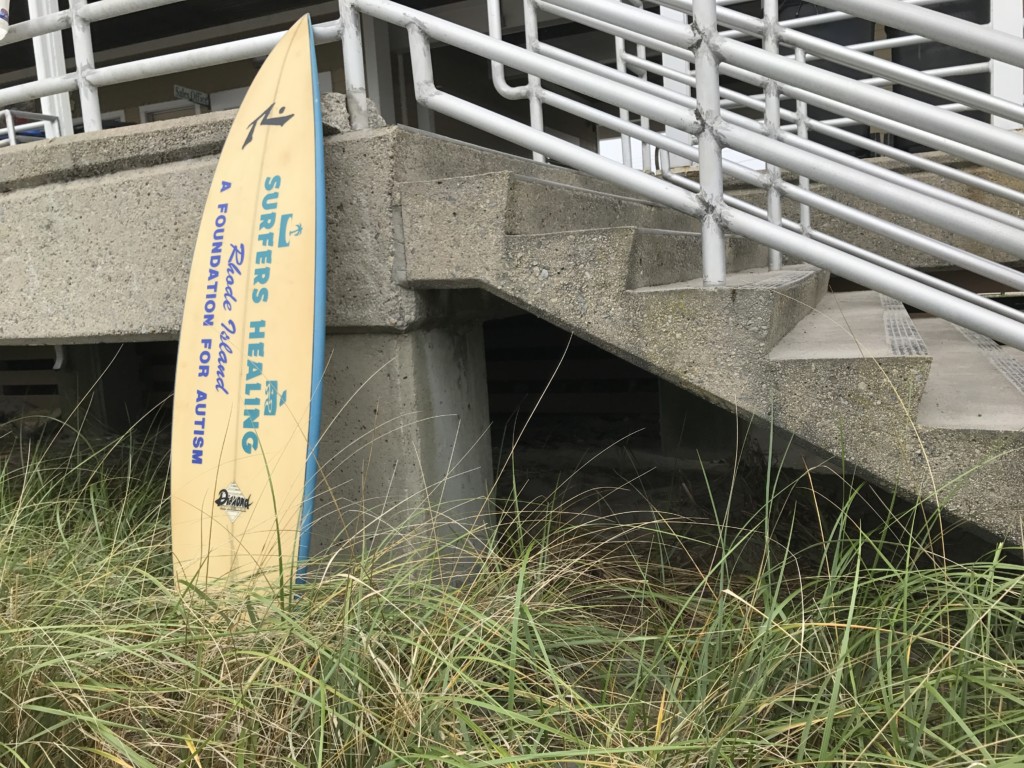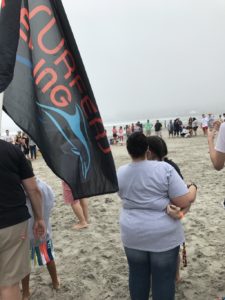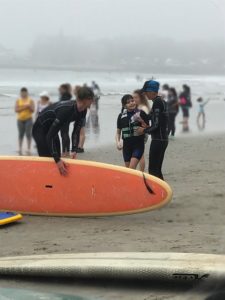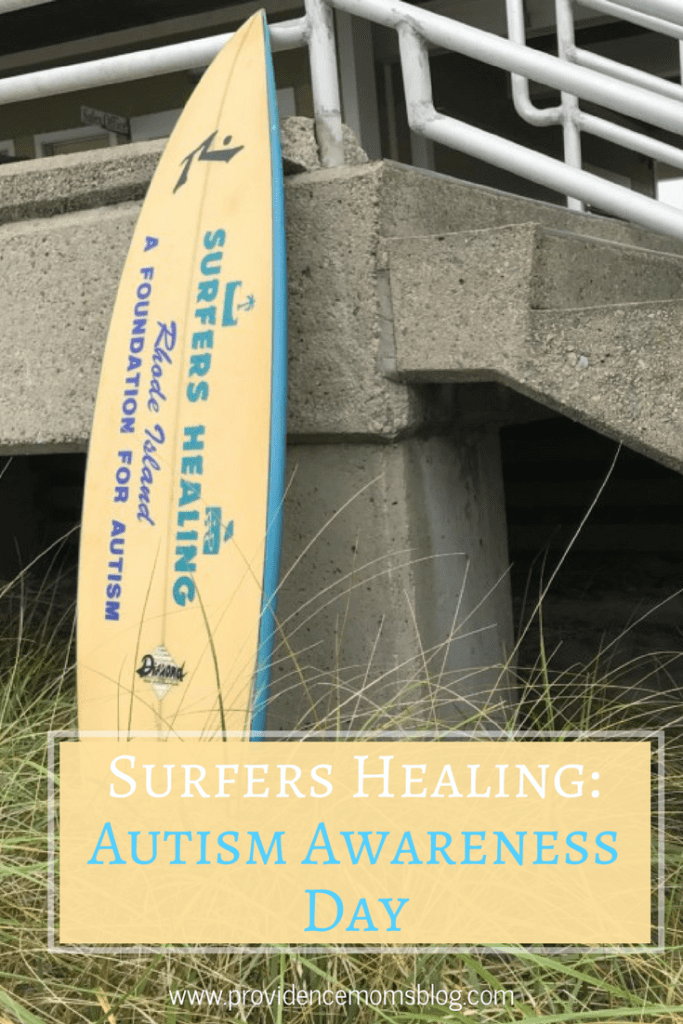 What do you get if you take 200 kids with autism, two handfuls of professional surfers, a few dozen boxes of Allie’s donuts, and serve it all up on a chilly September morning? One perfect day, made possible by Surfers Healing, a non-profit organization whose mission is “ to enrich the lives of people living with autism by exposing them to the unique experience of surfing.” As someone who grew up on a steady diet of Rocket Power and surfer envy, I think this might be the coolest mission statement I’ve ever heard. I was invited to this incredible event by my friend Raquel. Her daughter Anissa is 13 years old. She has an amazing memory, she loves cats, and she is one of the rare girls on the autism spectrum. She’s also allergic to everything from peanuts to grapes. After this event I can add one more thing to her description: she loves surfing.
What do you get if you take 200 kids with autism, two handfuls of professional surfers, a few dozen boxes of Allie’s donuts, and serve it all up on a chilly September morning? One perfect day, made possible by Surfers Healing, a non-profit organization whose mission is “ to enrich the lives of people living with autism by exposing them to the unique experience of surfing.” As someone who grew up on a steady diet of Rocket Power and surfer envy, I think this might be the coolest mission statement I’ve ever heard. I was invited to this incredible event by my friend Raquel. Her daughter Anissa is 13 years old. She has an amazing memory, she loves cats, and she is one of the rare girls on the autism spectrum. She’s also allergic to everything from peanuts to grapes. After this event I can add one more thing to her description: she loves surfing.
“Isn’t it a bit cold for surfing, Raquel?” It was 7 am on a Saturday and we were already Narragansett bound, coffees in hand.
“No!” The excitement in her voice was palpable. “A lot of these kids don’t really feel temperature. That’s why they do it this time of year. The beach is empty and they can just be themselves!” She was beaming. As I drove, I thought about the unlikelihood of me ever meeting these two unique women, and yet here we were, driving, chatting, drinking coffee. Friendship is funny like that. One day you’re strangers, then suddenly you’re not.
When we finally reached the parking lot, SUVs and minivans were emptying themselves like clown cars. Excitement charged the foggy air as families made their way down to the shoreline. After a short eternity, Anissa finally got to hit the waves. This kid loves the water. Dozens of other smiles shining through the fog told me she wasn’t alone. There is a reason they call it “One Perfect Day.”

The whole experience was a metaphor for our friendship. I went there to support Anissa, but I left so much more enriched myself. The people in this community can be very guarded because of the judgment they face every day in a world just doesn’t get them. Yet, I, a neurotypical woman with three developmentally typical sons, got to share in their one perfect day. That’s not normal, but it should be. It is very difficult for families touched by autism (and other special needs) to build relationships outside of their own circle. This is a problem for all of us, not just them. I need Raquel and Anissa in my life to remind me that my way of parenting isn’t the only way and that my problems aren’t the only problems. I want my boys to grow up arm and arm with Anissa because I want them to learn compassion, empathy, and kindness, and I don’t want them to see different as scary.
Building relationships with people just like us is hard enough. Reaching out to people unlike us can be downright intimidating. With that in mind, here are some steps you can take to building these relationships when the opportunity arises, and since autism is the fastest growing developmental disability in America today, the opportunity will arise.
- Special Needs Moms are Normal Moms: These incredible women deal with a whirlwind of issues many of us cannot imagine, but they are still moms. They need friends who will bring over a bottle of wine for a Gilmore Girls binge, and that they frantically text about deals at Target, just like the rest of us.
- We’re Different, We’re the Same: This is the title of a Sesame Street book we have kicking around our house. Reading books like this to our children when they are young sets a foundation to embrace different, instead of shying away from it.
- Don’t Be Afraid to Ask Questions: I know this feels uncomfortable, but that’s how relationships work. Say, “Hi! Your daughter looks so adorable. Where did you get her dress?” or “How old is your son?” Normal human stuff. Once they share their child’s diagnosis with you, ask questions like, “What is autism spectrum disorder?” or “When did he get his diagnosis?” If your child has questions don’t shush them.”To us there are no wrong questions,” says Raquel. Teach them how to ask with kindness and sensitivity. Don’t just look away “to make them feel more comfortable.” That is only making you feel more comfortable.
- Don’t Assume: If a child seems to ignore your greeting don’t assume they are being rude. If you notice a child on the playground that exclusively eats goldfish don’t assume they are being malnourished. If you meet a four-year-old in diapers don’t assume they have lazy parents. If a child has a public meltdown they may not be a spoiled brat. Many kids on the spectrum do not appear to be at first glance. Get to know people before drawing conclusions about their parenting.
- Be Supportive: Share the links they share about autism awareness, show up to events when you are invited, and donate to causes they care about when you can!
If you or someone you love live life on the autism spectrum, I’d love to hear from you in the comments! How can the rest of us help your family ride the waves of autism?













